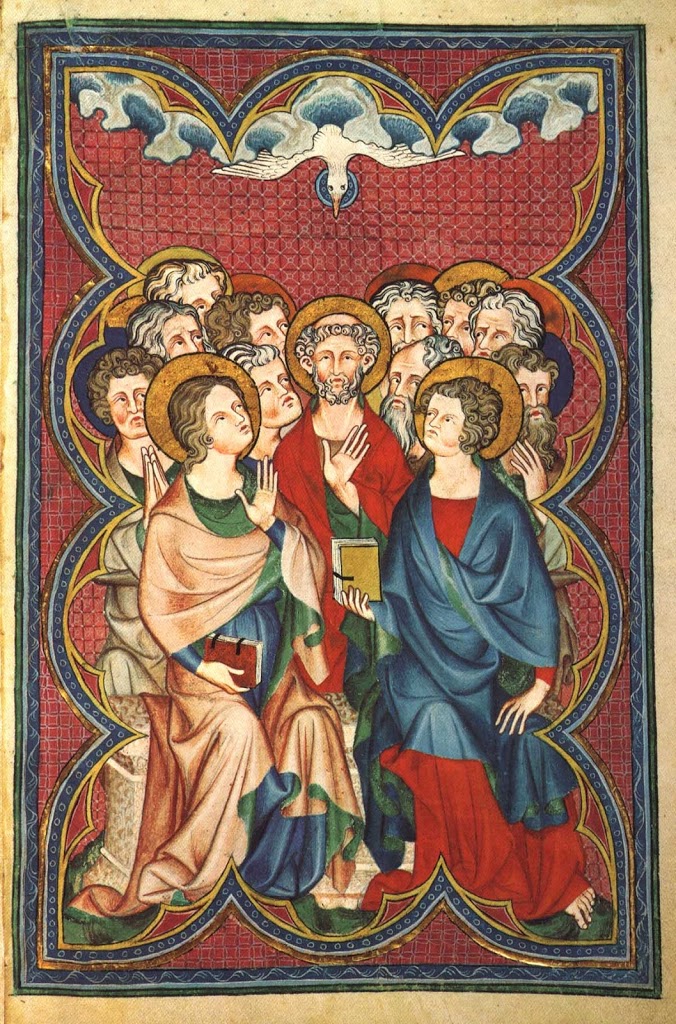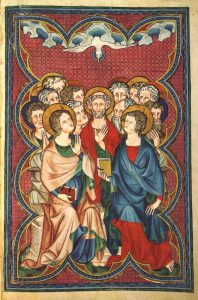Who is the Holy Spirit?
Pentecost Sunday (A)
click here for readings
I have found in my time as a Christian that the Holy Spirit can be notoriously hard to talk about. It is relatively easy for us to talk about God the Father. We have an image of fatherhood from our human fathers. We understand God as the creator, the first cause, the maker of all the universe. It is also fairly easy for us to talk about God the Son. The Son has a human face. We can read about the life and teachings of Jesus in the gospels. Of course we cannot fully comprehend the mysteries of the Father and the Son, but these concrete images help give us a place to start.
But how do we think about the Spirit? The scriptures give us different images of the Holy Spirit, all rather ephemeral. At Pentecost the Spirit manifests as tongues of fire. He is described as a “mighty wind.” At Jesus’ baptism He appears as a dove. In the Old Testament, the Spirit is the personification of Wisdom. The word spirit literally means “breath,” and so in our gospel reading for the feast of Pentecost we see Jesus breathing on the Apostles and saying, “Receive the Holy Spirit” (Jn 20:23). Breath, wind, fire, a dove — these images all convey movement. They refuse to be contained. None of them convey “personhood” in our way of thinking.
In a way it is understandable that we have such a hard time thinking about the Spirit. But it shouldn’t be this way. After all, we are spiritual beings. Yes, we have physical bodies, like the animals. But we are more than our bodies. We are body and soul. There is a spiritual aspect to our existence that we share in common with the angels, and yes, even with God.
We tend to be much more aware of our bodies than our souls. We can look down and see our hands and our feet. We can touch our skin and feel our muscles. By contrast, it’s relatively easy for us to forget about our souls. Yet our souls are vitally important. Remove the soul from the body and it becomes a corpse.
It is easier for us to forget about our soul not because it’s any less a part of us than our bodies, but because it is so much a part of us. Our soul is the center of who we are. It’s hard for us to be aware of our soul for the same reason that it’s hard for us to see our eye. You can’t see your eye, because your eye is what does the seeing. Your soul is what makes you aware. It’s too close, too near, too intimate to allow for objective perspective.
In our lives as Christians, we can sometimes take the Holy Spirit for granted, as He functions in the Church the way the soul functions in the body. He’s too near. But, like the soul, the Spirit is absolutely vital to the life of the Church. If the Spirit were to withdraw from the Church for one fraction of a moment, the Church would cease to exist. It would became a body without a soul, a lifeless corpse.
The Feast of Pentecost is an opportunity to remind ourselves of just how the Spirit functions in the Church and within us as individual Christians. First we can ask the basic question: what is the Holy Spirit?
Jesus Christ, the Son of God, is also called the Word or the Image of God. The Son is God’s perfect Image of Himself, and so He proceeds from the Father by the Divine Intellect. And what do the Father and the Son do? They love one another. (Love is an act of the will. It is not something one feels but rather something one does.) This Love that proceeds from the Father and the Son by the Divine Will is the Holy Spirit. Just as Jesus is God’s Word and the Image of God, the Holy Spirit is God’s Will and the Love of God.
Because we are made in the image of God, we also possess the divine qualities of rational intellect and free will. To use these faculties properly means that we must learn to think and to love as God does. We learn to think as God does by thinking in union with Christ, and we learn to love as God loves by cooperating with the Spirit. This is why the Spirit was sent to us, so that we might love like God. St. Paul says, “God’s love has been poured into our hearts through the Holy Spirit who has been given to us” (Rom 5:5).
The first thing that God’s Love does is offer forgiveness. Our sins keep us from being like God. They stand in the way of our holiness. If we are to love like God, we must first be freed from our sins. So Jesus gives the Apostles the Spirit so that they can carry out this vital work of forgiveness and reconciliation. “Receive the Holy Spirit,” He tells them, “Whose sins you forgive are forgiven them, and whose sins you retain are retained” (Jn 20:23). We participate in this forgiveness first through our baptism, and subsequently through the sacrament of reconciliation (confession), by the power of the Holy Spirit still at work in the Church.
Having been freed from our sins, the Spirit is then able to help us grow more and more in accord with the image of God. This is manifested through what we call the “fruits” of the Holy Spirit: love, joy, peace, patience, kindness, goodness, faithfulness, gentleness and self-control (Gal 5:22-23). These are not things that we do but rather things that the Spirit does for us. If we cooperate with God’s grace by avoiding sin, obeying the commandments, and pursuing love of God and neighbor, we will experience these things in our lives.
The Spirit is what unites us to God. He is what binds us together as members of Christ’s Body. He makes it possible for us to become holy. We cannot do this on our own, so the Spirit provides us with divine strength. St. Paul says, “The Spirit helps us in our weakness; for we do not know how to pray as we ought, but the Spirit Himself intercedes with sighs too deep for words” (Rom 8;26).
Finally, the Spirit also makes it possible for us to participate in Christ’s mission. As I have mentioned many times previously, we are all called to be evangelizers. The Spirit gives us the power to be Christ’s witnesses in the world. We see this in the Pentecost reading from Acts 2:1-11, when the Apostles are transformed by the Holy Spirit from fearfully hiding behind locked doors to openly and boldly proclaiming the good news of Christ.
We may not be able to speak in tongues, like the Apostles did on that first Pentecost. The gifts of the Holy Spirit are manifested in different ways to different people, in different times and places, according to God’s plan. But the Spirit is the same. The Holy Spirit that descended upon the Apostles at Pentecost is the same Holy Spirit that gives life to the Church today. It is the same Holy Spirit that each one of us has received (or will receive) at our confirmation. The same Spirit unites us to the same God, makes us sharers in the same Love, and gives us the power to fulfill the same mission — that of reconciling a fallen world to its Maker. Let us strive always to remain in the Spirit, and do our part in carrying out His work of salvation.


